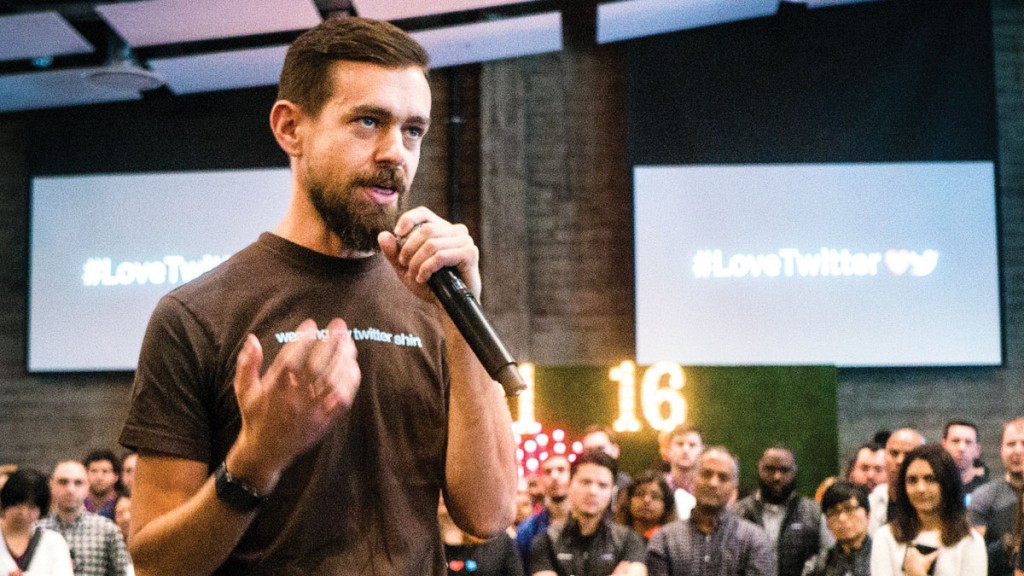
It’s hugely popular, but the social-media platform has never turned a profit. Suitors are circling nevertheless…
Shares in microblogging platform Twitter shot up by more than 20% in the last week after rumours began circulating that it could be sold. With shares at around $23 – below their float price of $26 and almost half their peak of almost $45 – the company is valued at $20bn.
Twitter may seem like a huge success – it boasts 313 million monthly users – but it has never made a profit, and growth has effectively ground to a halt. The number of users isn’t rising much at all, and the ones it has are spending “far less” time on its service than on rivals such as Facebook and Snapchat, says The Economist.
A year ago, after a “string of departures by senior executives”, CEO Dick Costolo was replaced by Twitter’s co-founder, Jack Dorsey (pictured), who had been forced out of the company in 2008. But despite his return, Twitter has “failed to come up with the new ideas needed to reach a wider group of users”, according to Richard Waters and Tim Bradshaw in the Financial Times.
“It’s hard to see why anyone would want to buy Twitter,” says Jim Armitage at the Evening Standard, unless it is sold “for a song”. It may be worth its “current rumour-swollen value” if it was “a business that was growing its number of users exponentially. But it’s not.” However, both Google and cloud-computing company Salesforce are said to be interested, along with other suitors including Microsoft (which outbid Salesforce for LinkedIn), Verizon (which owns AOL), Disney and Apple.
Twitter would be an “excellent fit” for Salesforce, says Ron Miller on Techcrunch. com. One of its main attractions, says Waters and Bradshaw, is the “real-time information it can supply to corporate marketers about millions of their consumers” – although the arguments for owning Twitter “are not as strong as those for buying LinkedIn”, and Salesforce “might find it hard to sell a deal to its own shareholders”.
But Google is “the sort of acquirer who would be able to reap the most immediate value from a deal” as it is able to “instantly boost profit margins, taking out costs and pumping its own advertising into the network”, making Twitter “a new growth engine for Google’s advertising business”.
Despite its many problems, Twitter is still an “attractive asset” with a “treasure trove of untapped data”, agrees Steve Kovach on BusinessInsider.com. It could still “flourish under a parent company that provides additional resources and leeway”. However, the firm needs to sell itself now. If not, it risks the same fate as Yahoo – “a decade-long stagnation” followed by “a desperate sale for a tiny fraction of its peak valuation”. Yahoo was once valued at $125bn; in July this year, it agreed to be bought by Verizon for $4.8bn.
Holiday firms battle headwinds
Travel operator Thomas Cook’s latest trading update revealed a dent to earnings as bookings to Turkey slumped in the wake of the country’s attempted coup and repeated bombings by terrorist groups. But the company stood by its earnings forecast of £300m for the year, a forecast it had reduced by some 10% earlier in the year.
“The summer season has progressed largely as expected,” said Peter Fankhauser, Thomas Cook’s chief executive. “Customers’ desire to go abroad on holiday has remained strong with the exception of Turkey.” The firm’s shares rose ahead of the announcement, but later fell back. They have dropped by more than 40% this year.
While Thomas Cook battles on through market headwinds, budget airline Monarch appears to be struggling. The firm was forced to deny rumours it was on the verge of collapse. Monarch went “cap in hand to private equity owners Greybull”, says The Daily Telegraph, to ask for “more money to help see it through the long winter season”. That “sparked fears of bankruptcy and concern that travellers could be left stranded”. It’s not the first time this year that Monarch has needed a cash injection, having tapped investors for £35m in short-term funding in June.